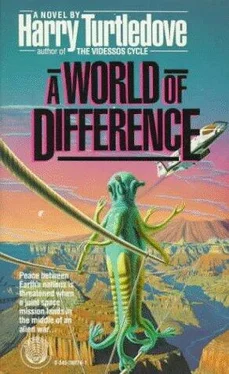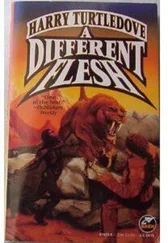But the chekist was no mean Marxist-Leninist theologian himself. “There is nothing wrong with capitalism as it emerges, Valery Aleksandrovich, only when in its decadence it stands in the way of the arrival of true socialism, as it does on Earth. Here on Minerva, capitalism is the progressive ideology and economic structure. To the east of the canyon, the domains are feudal in organization, is it not so?”
“Bozhemoi. “Bryusov was not used to eyeing the KGB man with respect; carefully veiled contempt was what he usually felt for him. But he had to confess, “That is a very pretty argument, Oleg Borisovich.”
“Yes, I know,” Lopatin said complacently.
A clever chekist is still a chekist, Bryusov reminded himself. “Interesting also, I think,” Lopatin went on, “how here as well as on Earth the Americans find themselves aligned with the forces of reaction while we stand with those of progress.”
“Most interesting,” the linguist agreed. The more he thought through the implications of what Lopatin had said, the less he liked them. He held up his healing arm. “Don’t forget how the Americans helped us-helped me-at great risk to themselves. Here on Minerva, if nowhere else, we truly have a classless society of humans.”
“Of humans, perhaps,” Lopatin said, as if making a great concession, “but not of intelligent beings. And what we do here will also be closely observed by people’s movements all over the world back home.”
“And by the Americans and their friends.” Now Bryusov was genuinely alarmed. Bringing quarrels from Earth to Minerva was bad enough, but letting a Minervan quarrel create trouble on Earth struck him as worse.
“Moscow will instruct us as to our proper course,” Lopatin said.
He sounded as if he were trying to reassure the linguist, but Bryusov remained unassured. The apparatchiks back home were as rigid as Lopatin. “I would sooner let us make our decisions on the spot,” Bryusov said. “Surely we have a better feel for the Minervans than do men who have never seen one.”
“Even the Americans, with their prattling of liberty, are not so foolish as that,” Lopatin said. “When Houston gives an order as it did about these talks-the crew of Athena simply obeys.”
“Oleg Borisovich, this is the first time I have ever heard you argue that we can do no better than imitating the Americans,” Bryusov answered mildly. He cherished the glower the chekist gave him.
Reatur glowered at the box Irv held in one of his large, strange hands. The domain master had come to accept and eventually to ignore such boxes in humans’ hands, even when the voices of other humans came out of them. He had never imagined a person’s voice might also travel in such fashion-especially not if the person was a Skarmer. “He won’t be able to see as well as hear, will he?” Reatur asked for the third time.
“No,” Irv answered. “You see into Skarmer lands?”
“No,” Reatur admitted unhappily. “Let me listen to his lies, then, and have done, so I can go on working to keep my domain safe from his greed.”
When humans sighed, the domain master thought, they sounded eerily like people. Irv pressed the box here and there and then spoke into it. A rumbling voice-a human male’s voice-replied at once. It belonged to neither Emmett nor Frank.
Reatur recognized the way they sounded. So there truly were more humans than he had seen… Despite everything the weird creatures had said, he had wondered.
Irv brought him out of his eyestalk-twiddling by handing him the box. “Talk into it,” the human said. “Hogram hears you.” “Reatur underhanded in trade talk.”
“How should I know?” Hogram used the same clipped, simplified speech. He sounded old, Reatur thought. The Omalo domain master had known that; it had to be so, if Hogram’s eldest of eldest was a male who could be entrusted with responsibility. But heating Hogram’s voice made the knowledge real in a way it had not been before.
“Why are you talking to me, then?” Reatur said.
“Because the”-Hogram used a word Reatur did not know-“asked me to.”
“The who?”
“The two legged, two armed creatures who make strange things like the box we are using to talk now. That’s what they call themselves in their own language.”
“Oh. The ones here call themselves ‘humans,’ and so we use that name for them, too.”
“Call them whatever you like. They are strange enough and strong enough that I do not care to tell them no without some truly pressing reason-nor do you, I notice.”
“Never mind what I do,” Reatur snapped. “The humans here say that if we talk, perhaps we can find a way not to fight. Stay on your side of Ervis Gorge and you will prove them right.”
“If I could, I would. But we have too many males, too many mates for our land to feed. If you peaceably yield your domain, perhaps we can work out a fate for your males less drastic than the one Fralk first proposed to you. Some of your budlings might be allowed to live on, to plant buds themselves and to work with us toward building a new land.”
“What do you mean, work with you?” Reatur did not trust the sound of that smooth-sounding phrase. “As what?”
“You know that many of us are traders rather than farmers or herders,” Hogram said. “We could, I suppose, use some males whose talents lie in those directions.”
Rage tipped through Reatur. “Use them as slaves, you mean, without even right of appeal to clanfather. For they’d not be of the same clan as your precious young Fralk, now, would they? You Skarmer aren’t traders, Hogram, you’re cheats and thieves.”
He was deliberately insulting, trying to infuriate Hogram as he had been infuriated. The Skarmer domain master, though, seemed armored against insult. “In your obstinacy, Omalo, you have made me become more generous. Cherish that; not many may boast of it.”
“Imagine my delight.” Reatur made his voice as hot with scorn as the meltwater that brawled through Ervis Gorge. “Save such praise for dealings with your fellow Skarmer, who can properly appreciate it.” He shortened his eyestalks in surprise as he thought of something new. “Why even think of crossing the gorge, Hogram? Why not seize the domains of your neighbors, if you need land so badly? Surely that would be simpler for you.”
“I wish you had been budded a fool; my life would be easier.” This time Hogram sounded as though he really was giving a compliment, not sardonic as he had been before. “In truth, though, all the Skarmer domains hereabouts find themselves in the same straits as do I: too many folk, not enough food. My domain might be bigger were I to conquer them, but no better off.”
That made sense to Reatur. He almost wished it had not; he had not expected to be able to see out of Hogram’s eyestalks. Thinking of the Skarmer domain master as a male with problems of his own was less comfortable than simply thinking of him as the enemy. It could be useful, though, if it gave him clues about how Hogram would plot.
As if changing the subject, Reatur asked, “Do your humans come in two kinds, one with a deep rumbling voice and the other that sounds like a person?”
Hogram, Reatur thought, was sharp or at least suspicious. The Skarmer domain master’s voice turned cautious at once as he answered, “Yes, they do. What of it?”
The reply was innocuous enough, but Reatur felt like hooting with glee. Instead, as casually as before, he asked, “Have they told you that the ones who sound like people are mates, and the others males?”
By Hogram’s response, he already knew that the humans on the Skarmer side of the gorge had not. And if Hogram suddenly learned something as unsettling as that, it might help drive him apart from his humans. Reatur was convinced that such a rift would prove useful; he still wasn’t sure what powers humans had, but keeping those powers estranged from the Skarmer had to be a good idea.
Читать дальше












